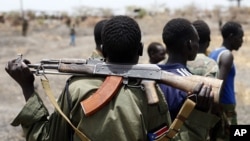AWEIL, SOUTH SUDAN —
The head of South Sudan’s Bureau for Small Arms Control has called for a nationwide effort to drastically reduce the number of firearms in the country, saying a “gun-free society” is key to stability in the fledgling nation.
“It is absolutely fundamental for all of us – for communities, for the government, for religious leaders, for traditional leaders, for you and everybody -- to ensure we live in a peaceful environment, a gun-free society. When we do that, I think the government will be able to provide services to the people,” Riak Gok Majok, director of the Interior Ministry bureau tasked with gun control, said in an interview with VOA News.
Huge numbers of guns flowed into Sudan during 22 years of civil war between the north and south, which ended in 2005.
A report by the Geneva-based Small Arms Survey said there were some 2.7 million small arms and light weapons in then still-unified Sudan in 2009. Around two million of those weapons were “in the hands of civilians countrywide."
South Sudan, where most of the civil war was fought, gained independence in 2011 under the terms of the peace agreement that ended the war with Khartoum.
The role of the Bureau for Small Arms Control is not to physically disarm civilians in South Sudan but to act as a central coordinating body to ensure that weapons surrender happens peacefully, Majok said.
The bureau has drafted “a law which will govern the use and possession of small arms in this country,” and is coordinating partnerships with international organizations, such as the United Nations Development Program (UNDP), to fund disarmament.
It also runs programs to raise awareness in communities of the need to turn in weapons, Majok said.
A key obstacle to successful disarmament in South Sudan is the lack of facilities to securely store weapons surrendered by civilians, Majok said.
“We know very well that, even if we disarm, if we do not have strong storage facilities to store the collected guns, they will come back to the community,” he said.
To overcome that, the bureau has set up a program to mark all small arms that are handed in to the authorities. “If a gun goes back into the community, it will be known where that gun is coming from,” Majok explained.
Majok spoke to VOA News in Northern Bahr el Ghazal state, where he said there are around 8,000 guns in an area of around 30,500 square kilometers.
“It is absolutely fundamental for all of us – for communities, for the government, for religious leaders, for traditional leaders, for you and everybody -- to ensure we live in a peaceful environment, a gun-free society. When we do that, I think the government will be able to provide services to the people,” Riak Gok Majok, director of the Interior Ministry bureau tasked with gun control, said in an interview with VOA News.
Huge numbers of guns flowed into Sudan during 22 years of civil war between the north and south, which ended in 2005.
A report by the Geneva-based Small Arms Survey said there were some 2.7 million small arms and light weapons in then still-unified Sudan in 2009. Around two million of those weapons were “in the hands of civilians countrywide."
South Sudan, where most of the civil war was fought, gained independence in 2011 under the terms of the peace agreement that ended the war with Khartoum.
The role of the Bureau for Small Arms Control is not to physically disarm civilians in South Sudan but to act as a central coordinating body to ensure that weapons surrender happens peacefully, Majok said.
The bureau has drafted “a law which will govern the use and possession of small arms in this country,” and is coordinating partnerships with international organizations, such as the United Nations Development Program (UNDP), to fund disarmament.
It also runs programs to raise awareness in communities of the need to turn in weapons, Majok said.
A key obstacle to successful disarmament in South Sudan is the lack of facilities to securely store weapons surrendered by civilians, Majok said.
“We know very well that, even if we disarm, if we do not have strong storage facilities to store the collected guns, they will come back to the community,” he said.
To overcome that, the bureau has set up a program to mark all small arms that are handed in to the authorities. “If a gun goes back into the community, it will be known where that gun is coming from,” Majok explained.
Majok spoke to VOA News in Northern Bahr el Ghazal state, where he said there are around 8,000 guns in an area of around 30,500 square kilometers.






